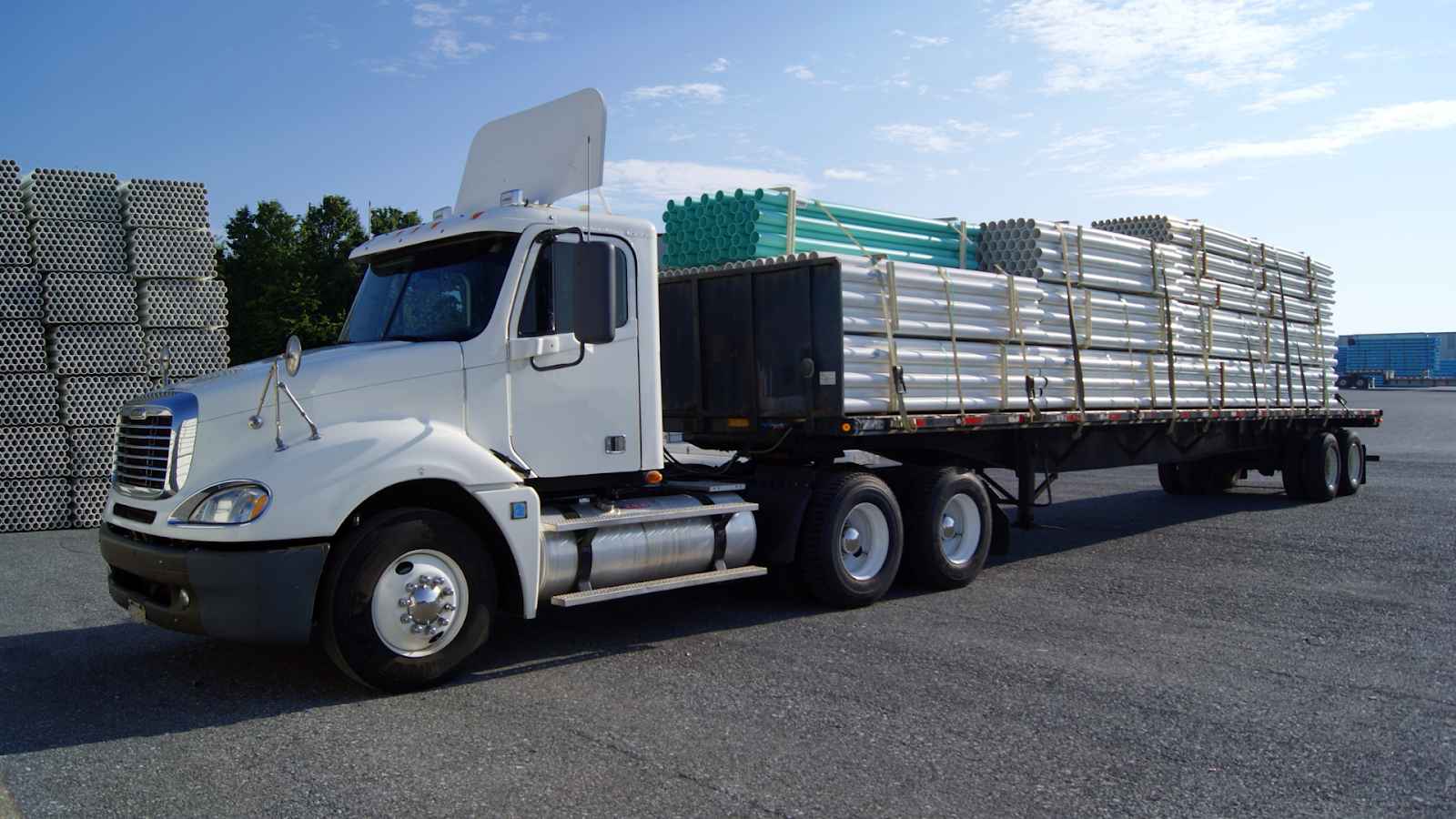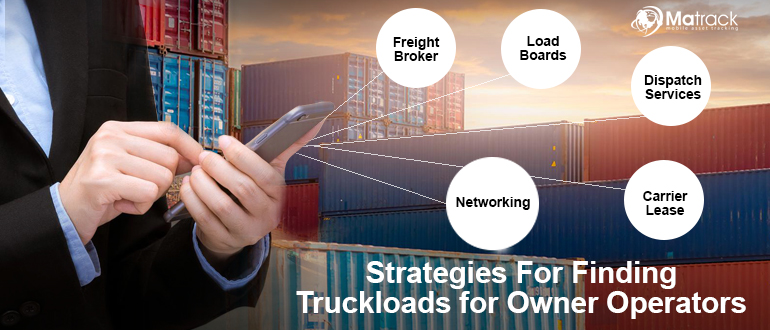Key Takeaways
- Freight brokers provide steady loads but take a percentage of your earnings.
- Load boards offer flexibility and direct freight access but come with high competition and broker fees.
- Dispatching services simplify load booking and paperwork but reduce independence due to service fees.
- Leasing onto a carrier guarantees consistent loads, while networking helps secure direct, high-paying contracts.
How Do Owner-Operators Find Loads?
1. Work with a Freight Broker
A freight broker connects owner-operators with shippers by sourcing and negotiating loads. Many brokers have exclusive access to freight contracts that independent truckers might not find on public load boards.

Why Work with a Freight Broker?
✅ More Load Options – Brokers work with multiple shippers, increasing your freight availability.
✅ Saves Time – Instead of searching for loads, brokers handle negotiations and paperwork.
✅ Higher Rates – Good brokers negotiate premium freight that pays better than standard load board listings.
✅ Control Over Load Selection – You can accept or decline loads based on your schedule.
Challenges of Freight Brokers
❌ Broker Fees – Brokers take 10-25% of the load payment, cutting into your profits.
❌ Less Direct Control – You rely on the broker instead of securing your own direct shipper contracts.
❌ Rate Transparency Issues – Some brokers prioritize their commission over getting you the best rate.
How to Find a Reliable Freight Broker
- Work with brokers certified by the Transportation Intermediaries Association (TIA).
- Check ratings and reviews on DAT Freight & Analytics and Truckstop.com.
- Ask for a broker-client contract to clarify payment terms and rate structures.
A freight broker is a solid option if you want consistent truckloads without spending hours searching for them yourself.
2. Use a Load Board for Trucks
A load board is an online platform where owner-operators can search, compare, and book loads in real-time. This is one of the fastest ways to fill empty miles and keep your truck moving.
Top Benefits of Load Boards
✅ Instant Access to Loads – Find available freight 24/7 without waiting on brokers.
✅ Complete Control – Choose your own routes, rates, and load types.
✅ Competitive Pricing – Some load boards allow you to negotiate rates directly with shippers.
✅ Filtering Options – Search by lane, weight, rate per mile, and load type to find the best-paying freight.
Challenges of Load Boards
❌ High Competition – Large fleets book high-paying loads quickly.
❌ Broker Fees – Many loads are brokered, meaning you’ll still pay a middleman fee.
❌ Low-Paying Freight – Some load boards list cheap freight that isn’t worth hauling.
Best Load Boards for Owner-Operators
- DAT Load Board – Largest database, best for spot market loads.
- Truckstop.com – Offers freight negotiation tools and broker credit scores.
- 123Loadboard – Includes load-matching, fuel discounts, and route planning tools.
A load board is a great option for owner-operators who want flexibility and full control over their business.
3. Hire a Dispatching Service
A dispatching service finds, books, and negotiates loads for owner-operators, handling administrative tasks like paperwork, invoicing, and compliance.

Why Use a Dispatching Service?
✅ Consistent Load Availability – Dispatchers actively search for premium loads, reducing downtime.
✅ Less Hassle – They handle negotiations and paperwork, allowing you to focus on driving.
✅ Higher-Paying Freight – Good dispatchers negotiate better rates than you might find on load boards.
✅ Backhaul & Load Planning – Dispatchers help plan back-to-back loads, minimizing deadhead miles.
Challenges of Dispatching Services
❌ Service Fees – Dispatchers charge 5-10% per load, reducing your profits.
❌ Less Independence – You rely on them for loads instead of finding your own contracts.
❌ Quality Varies – Not all dispatchers have strong shipper relationships or industry knowledge.
How to Choose a Good Dispatcher
- Look for dispatchers who specialize in your type of trucking (flatbed, reefer, dry van, etc.).
- Avoid dispatchers with hidden fees or long-term contracts.
- Check reviews and get recommendations from other owner-operators.
A dispatching service is best for owner-operators who want to focus on driving while outsourcing load booking and negotiations.
4. Lease On with a Carrier
Leasing onto a larger carrier means operating under their trucking authority, insurance, and dispatch network, ensuring steady truckloads with fewer administrative responsibilities.

Benefits of Leasing On with a Carrier
✅ Guaranteed Freight – Carriers ensure steady shipments year-round.
✅ Lower Overhead Costs – No need to pay for your own authority, insurance, or compliance fees.
✅ Fuel Discounts & Perks – Many carriers offer fuel cards, tire discounts, and maintenance programs.
✅ Less Administrative Work – The carrier handles paperwork, billing, and dispatching.
Challenges of Leasing On
❌ Lower Profit Margins – Carriers take a percentage of your earnings.
❌ Less Flexibility – You must follow their dispatch system and assigned routes.
❌ Contract Limitations – Some carriers restrict you from taking outside freight.
Best Carriers for Owner-Operators
- Landstar – Offers self-dispatching and flexible load selection.
- Schneider – Provides fuel discounts and steady freight.
- Mercer Transportation – Allows owner-operators to choose their own loads.
Leasing on is ideal for owner-operators who prefer steady work without the headaches of finding loads.
5. Network for Direct Freight Opportunities
Building relationships with shippers, brokers, and other truckers can help owner-operators secure exclusive, high-paying freight without relying on middlemen.
How to Network as an Owner-Operator
- Join Trucking Associations – Groups like OOIDA offer business resources and shipper connections.
- Attend Industry Events – Trucking expos and conferences help you connect with potential shippers.
- Use Social Media – LinkedIn, Facebook trucking groups, and forums can lead to direct freight contracts.
- Ask for Referrals – If you have a strong reputation, brokers and shippers will refer you to premium freight opportunities.
Why Networking Works for Owner-Operators
✅ Cuts Out Brokers – Avoid middleman fees and deal directly with shippers.
✅ Access to Exclusive Freight – Many shippers prefer working with trusted owner-operators.
✅ More Consistent Work – Long-term relationships lead to repeat business.
If you want higher-paying loads without relying on brokers or load boards, networking is key to growing your owner-operator business.
Conclusion
Owner-operators can maximize their truckload opportunities by combining multiple strategies. Whether you choose to work with freight brokers, load boards, dispatchers, or direct shippers, having a diverse approach ensures higher profits and fewer dead miles.



